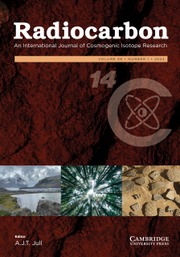Crossref Citations
This article has been cited by the following publications. This list is generated based on data provided by
Crossref.
Austin, W. E. N.
Bard, Edouard
Hunt, J. B.
Kroon, Dick
and
Peacock, J. D.
1995.
The 14C Age of the Icelandic Vedde Ash: Implications for Younger Dryas Marine Reservoir Age Corrections.
Radiocarbon,
Vol. 37,
Issue. 1,
p.
53.
Goślar, Tomasz
Arnold, Maurice
and
Pazdur, Mieczysław F.
1995.
The Younger Dryas Cold Event—Was It Synchronous Over the North Atlantic Region?.
Radiocarbon,
Vol. 37,
Issue. 1,
p.
63.
Kitagawa, Hiroyuki
Fukuzawa, Hitoshi
Nakamura, Toshio
Okamura, Makoto
Takemura, Keiji
Hayashida, Akira
and
Yasuda, Yoshinori
1995.
AMS 14C Dating of Varved Sediments from Lake Suigetsu, Central Japan and Atmospheric 14C Change During the Late Pleistocene.
Radiocarbon,
Vol. 37,
Issue. 2,
p.
371.
Kemp, Alan E. S.
1996.
Laminated sediments as palaeo-indicators.
Geological Society, London, Special Publications,
Vol. 116,
Issue. 1,
Wohlfarth, Barbara
1996.
The chronology of the last termination: A review of radiocarbon-dated, high-resolution terrestrial stratigraphies.
Quaternary Science Reviews,
Vol. 15,
Issue. 4,
p.
267.
Wohlfarth, B.
Björck, S.
Holmquist, B.
Possnert, G.
Björck, J.
Ising, J.
and
Olsson, S.
1996.
The Late Weichselian varved clays in SE Sweden: Radiocarbon and varve chronology, pollen stratigraphy and geochemistry.
GFF,
Vol. 118,
Issue. sup004,
p.
72.
Hang, Tiit
1997.
Clay varve chronology in the Eastern Baltic area.
GFF,
Vol. 119,
Issue. 4,
p.
295.
Thompson, L. G.
Yao, T.
Davis, M. E.
Henderson, K. A.
Mosley-Thompson, E.
Lin, P.-N.
Beer, J.
Synal, H.-A.
Cole-Dai, J.
and
Bolzan, J. F.
1997.
Tropical Climate Instability: The Last Glacial Cycle from a Qinghai-Tibetan Ice Core.
Science,
Vol. 276,
Issue. 5320,
p.
1821.
WOHLFARTH, BARBARA
BJÖRCK, SVANTE
CATO, INGEMAR
and
POSSNERT, GÖRAN
1997.
A new middle Holocene varve diagram from the river Ångermanalven, northern Sweden: indications for a possible error in the Holocene varve chronology.
Boreas,
Vol. 26,
Issue. 4,
p.
347.
Ising, Jonas
1998.
Late Weichselian pollen stratigraphy, clay-varve chronology, radiocarbon chronology, and palaeomagnetic secular variations at Farslycke, Blekinge, southern Sweden.
GFF,
Vol. 120,
Issue. 4,
p.
321.
Burr, G. S.
Beck, J. Warren
Taylor, F. W.
Récy, Jacques
Edwards, R. Lawrence
Cabioch, Guy
Corrège, Thierry
Donahue, D. J.
and
O'malley, J. M.
1998.
A High-Resolution Radiocarbon Calibration Between 11,700 and 12,400 Calendar Years Bp Derived from 230Th Ages of Corals from Espiritu Santo Island, Vanuatu.
Radiocarbon,
Vol. 40,
Issue. 3,
p.
1093.
WOHLFARTH, BARBARA
BJÖRCK, SVANTE
POSSNERT, GÖRAN
and
HOLMQUIST, BJÖRN
1998.
An 800‐year long, radiocarbon‐dated varve chronology from south‐eastern Sweden.
Boreas,
Vol. 27,
Issue. 4,
p.
243.
Björck, Jonas
1999.
The Aller⊘d-Younger Dryas pollen zone boundary in an 800-year varve chronology from southeastern Sweden.
GFF,
Vol. 121,
Issue. 4,
p.
287.
Andrén, Thomas
Björck, Jonas
and
Johnsen, Sigfus
1999.
Correlation of Swedish glacial varves with the Greenland (GRIP) oxygen isotope record.
Journal of Quaternary Science,
Vol. 14,
Issue. 4,
p.
361.
Ridge, John C.
and
Toll, Nathaniel J.
1999.
Are late-glacial climate oscillations recorded in varves of the upper Connecticut Valley, northeastern United States?.
GFF,
Vol. 121,
Issue. 3,
p.
187.
LOWE, J. J.
BIRKS, H. H.
BROOKS, S. J.
COOPE, G. R.
HARKNESS, D. D.
MAYLE, F. E.
SHELDRICK, C.
TURNEY, C. S. M.
and
WALKER, M. J. C.
1999.
The chronology of palaeoenvironmental changes during the Last Glacial-Holocene transition: towards an event stratigraphy for the British Isles.
Journal of the Geological Society,
Vol. 156,
Issue. 2,
p.
397.
Fifield, L K
1999.
Accelerator mass spectrometry and its applications.
Reports on Progress in Physics,
Vol. 62,
Issue. 8,
p.
1223.
Haflidason, Haflidi
Eiriksson, Jon
and
Kreveld, Shirley Van
2000.
The tephrochronology of Iceland and the North Atlantic region during the Middle and Late Quaternary: a review.
Journal of Quaternary Science,
Vol. 15,
Issue. 1,
p.
3.
Buckau, G
Artinger, R
Kim, J.I
Geyer, S
Fritz, P
Wolf, M
and
Frenzel, B
2000.
Development of climatic and vegetation conditions and the geochemical and isotopic composition in the Franconian Albvorland aquifer system.
Applied Geochemistry,
Vol. 15,
Issue. 8,
p.
1191.
Wohlfarth, Barbara
and
Possnert, Göran
2000.
AMS Radiocarbon Measurements from the Swedish Varved Clays.
Radiocarbon,
Vol. 42,
Issue. 3,
p.
323.


